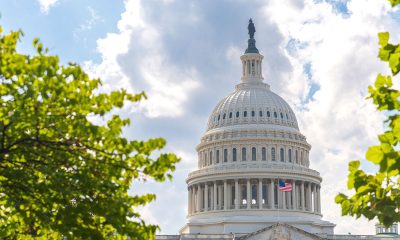Activism
White House Praises California Model; Says Equity Is Critical in COVID Fight
California was among the first states to start tracking racial data to determine why the disease, based on early infection patterns, was disproportionately impacting Blacks, Latinos and Native Americans. Although the rate of infections by race narrowed over time, the Centers for Disease Control and Prevention (CDC) and California Department of Health data still show higher COVID-19 death rates for African Americans than the general population.

By Aldon Thomas Stiles | California Black Media
Last week, Dr. Cameron Webb, the White House COVID-19 Response Team’s Senior Policy Advisor for Equity, discussed with California Black Media (CBM) the importance of fairness in the country’s fight against COVID. He complimented California’s pandemic response model.
“There has been a great model in California, which has always been a leader in some of these equitable initiatives,” Webb said.
He praised the work of Dr. Rohan C. Radhakrishna, deputy director for the California Department of Public Heath’s (CDPH) Office of Health Equity.
“Some of the work they’ve been doing on data collection in California had them tracking [COVID-19] across demographics in preparing to respond to the need. Without having the data, without knowing what the problems are, you can’t find the solution,” Webb said.
California was among the first states to start tracking racial data to determine why the disease, based on early infection patterns, was disproportionately impacting Blacks, Latinos and Native Americans.
Although the rate of infections by race narrowed over time, the Centers for Disease Control and Prevention (CDC) and California Department of Health data still show higher COVID-19 death rates for African Americans than the general population.
The COVID-19 death rate is 15% higher for Black Californians than the statewide average. Nationally African Americans account for 12% of the country’s population, but they make up about 14% of COVID-19 related deaths.
According to Webb, inequity in health care is one of the many challenges that need to be addressed as the country pushes to end the pandemic.
“Just to address it head on, we have an inequitable health care system,” Webb told CBM. “We have a health care system that does not serve all communities in a way that’s fair and that is rooted in systemic and structural dynamics that are themselves inequitable. We have inequitable risk factors, social risk, within communities.”
Webb said that the racial disparities that Americans have been struggling with during the COVID-19 pandemic continues to expose deeper systemic problems.
“COVID-19 really just highlights those inherent inequities and it makes it much more urgent, I would say, for some folks to find a strategy and solution,” Webb said.
During our interview, Webb provided an update on the state of the Black community during this pandemic.
“If you go back to 2021, back in late August, you actually saw that the rate of cases in the Black community was lower than the rate of cases in the white community,” Webb said.
“And that was all through September, all through October, and through most of November until the very end of November when Omicron started to surge. That’s when we saw the case rate jump up again in Black communities to be where it is now which is at 1.6 times the white case rate,” he pointed out.
Webb said that vaccination rates in the Black community are improving.
“In the earliest days of the vaccination effort, we saw pretty wide gaps emerge between white adults and Black adults. But by September of 2021, those rates were equivalent,” he said.
Webb pointed out that his team found that local communities around the country are taking steps to address racial disparities, too. However, challenges remain.
“We still see some gaps in who has been boosted,” he said. “We see some gaps in pediatric vaccination rates. We need to apply the same strategies that got our adult vaccination rates up to get kids vaccinated, and also to get more folks boosted.”
Webb said that they were seeing communities take the lead on that. “We are being as supportive as we can from the federal side because we know that it works.”
According to Webb, income inequality, housing instability, food insecurity, and educational inequity all correlate with health outcomes.
All of those factors, he said, contributed to communities of color facing disproportionate challenges during the pandemic.
“They leave a significantly higher burden of chronic illness in communities of color which leads to higher risk of poor outcomes with COVID-19,” Webb said.
Lastly, Webb described the White House’s approach to inequity in health care.
“We can’t solve all of the challenges that have developed in our society, in terms of structural inequity since 1619,” Webb said.
But in the short term, he said, there are acute issues that can be addressed, including:
- Creating workarounds to get more resources to the Black community and other hardest-hit communities;
- Medium-term fixes that can make sure these communities are more protected;
- Change to the system so that five or 10 years from now, children are not saying we have an inequitable health care system.
California Black Media’s coverage of COVID-19 is supported by the California Health Care Foundation.
Activism
OP-ED: AB 1349 Puts Corporate Power Over Community
Since Ticketmaster and Live Nation merged in 2010, ticket prices have jumped more than 150 percent. Activities that once fit a family’s budget now take significant disposable income that most working families simply don’t have. The problem is compounded by a system that has tilted access toward the wealthy and white-collar workers. If you have a fancy credit card, you get “presale access,” and if you work in an office instead of a warehouse, you might be able to wait in an online queue to buy a ticket. Access now means privilege.

By Bishop Joseph Simmons, Senior Pastor, Greater St. Paul Baptist Church, Oakland
As a pastor, I believe in the power that a sense of community can have on improving people’s lives. Live events are one of the few places where people from different backgrounds and ages can share the same space and experience – where construction workers sit next to lawyers at a concert, and teenagers enjoy a basketball game with their grandparents. Yet, over the past decade, I’ve witnessed these experiences – the concerts, games, and cultural events where we gather – become increasingly unaffordable, and it is a shame.
These moments of connection matter as they form part of the fabric that holds communities together. But that fabric is fraying because of Ticketmaster/Live Nation’s unchecked control over access to live events. Unfortunately, AB 1349 would only further entrench their corporate power over our spaces.
Since Ticketmaster and Live Nation merged in 2010, ticket prices have jumped more than 150 percent. Activities that once fit a family’s budget now take significant disposable income that most working families simply don’t have. The problem is compounded by a system that has tilted access toward the wealthy and white-collar workers. If you have a fancy credit card, you get “presale access,” and if you work in an office instead of a warehouse, you might be able to wait in an online queue to buy a ticket. Access now means privilege.
Power over live events is concentrated in a single corporate entity, and this regime operates without transparency or accountability – much like a dictator. Ticketmaster controls 80 percent of first-sale tickets and nearly a third of resale tickets, but they still want more. More power, more control for Ticketmaster means higher prices and less access for consumers. It’s the agenda they are pushing nationally, with the help of former Trump political operatives, who are quietly trying to undo the antitrust lawsuit launched against Ticketmaster/Live Nation under President Biden’s DOJ.
That’s why I’m deeply concerned about AB 1349 in its current form. Rather than reining in Ticketmaster’s power, the bill risks strengthening it, aligning with Trump. AB 1349 gives Ticketmaster the ability to control a consumer’s ticket forever by granting Ticketmaster’s regime new powers in state law to prevent consumers from reselling or giving away their tickets. It also creates new pathways for Ticketmaster to discriminate and retaliate against consumers who choose to shop around for the best service and fees on resale platforms that aren’t yet controlled by Ticketmaster. These provisions are anti-consumer and anti-democratic.
California has an opportunity to stand with consumers, to demand transparency, and to restore genuine competition in this industry. But that requires legislation developed with input from the community and faith leaders, not proposals backed by the very company causing the harm.
Will our laws reflect fairness, inclusion, and accountability? Or will we let corporate interests tighten their grip on spaces that should belong to everyone? I, for one, support the former and encourage the California Legislature to reject AB 1349 outright or amend it to remove any provisions that expand Ticketmaster’s control. I also urge community members to contact their representatives and advocate for accessible, inclusive live events for all Californians. Let’s work together to ensure these gathering spaces remain open and welcoming to everyone, regardless of income or background.
Activism
Oakland Post: Week of December 31, 2025 – January 6, 2026
The printed Weekly Edition of the Oakland Post: Week of – December 31, 2025 – January 6, 2026

To enlarge your view of this issue, use the slider, magnifying glass icon or full page icon in the lower right corner of the browser window.
Activism
Big God Ministry Gives Away Toys in Marin City
Pastor Hall also gave a message of encouragement to the crowd, thanking Jesus for the “best year of their lives.” He asked each of the children what they wanted to be when they grow up.

By Godfrey Lee
Big God Ministries, pastored by David Hall, gave toys to the children in Marin City on Monday, Dec. 15, on the lawn near the corner of Drake Avenue and Donahue Street.
Pastor Hall also gave a message of encouragement to the crowd, thanking Jesus for the “best year of their lives.” He asked each of the children what they wanted to be when they grew up.
Around 75 parents and children were there to receive the presents, which consisted mainly of Gideon Bibles, Cat in the Hat pillows, Barbie dolls, Tonka trucks, and Lego building sets.
A half dozen volunteers from the Big God Ministry, including Donnie Roary, helped to set up the tables for the toy giveaway. The worship music was sung by Ruby Friedman, Keri Carpenter, and Jake Monaghan, who also played the accordion.
Big God Ministries meets on Sundays at 10 a.m. at the Mill Valley Community Center, 180 Camino Alto, Mill Valley, CA Their phone number is (415) 797-2567.
-

 Activism4 weeks ago
Activism4 weeks agoDesmond Gumbs — Visionary Founder, Mentor, and Builder of Opportunity
-

 Activism4 weeks ago
Activism4 weeks agoFamilies Across the U.S. Are Facing an ‘Affordability Crisis,’ Says United Way Bay Area
-

 Alameda County4 weeks ago
Alameda County4 weeks agoOakland Council Expands Citywide Security Cameras Despite Major Opposition
-

 Alameda County4 weeks ago
Alameda County4 weeks agoBling It On: Holiday Lights Brighten Dark Nights All Around the Bay
-

 Activism4 weeks ago
Activism4 weeks agoBlack Arts Movement Business District Named New Cultural District in California
-

 Activism4 weeks ago
Activism4 weeks agoLu Lu’s House is Not Just Toying Around with the Community
-

 Activism4 weeks ago
Activism4 weeks agoOakland Post: Week of December 17 – 23, 2025
-

 Black History3 weeks ago
Black History3 weeks agoAlfred Cralle: Inventor of the Ice Cream Scoop


















































